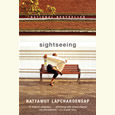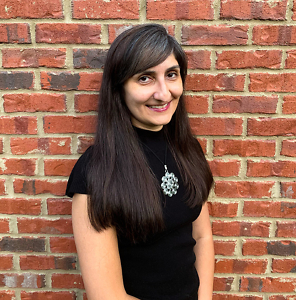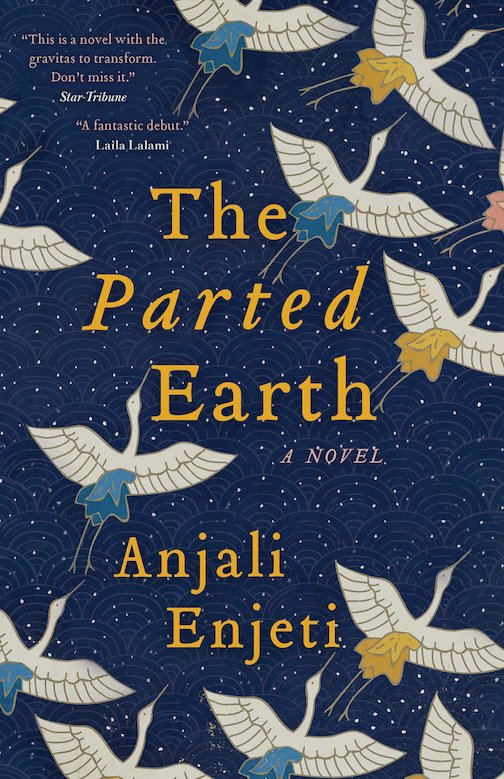Politics for Christians
Former governor Bill Haslam discusses the role of faith in government
A hearty guffaw comes from former Tennessee Gov. Bill Haslam when he’s asked about the remarkable lack of cynicism in his first book, Faithful Presence: The Promise and the Peril of Faith in the Public Square.
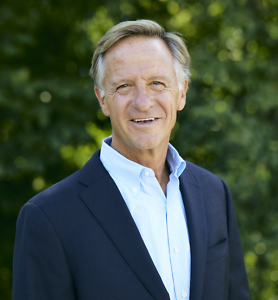 Haslam, 62, is a savvy Republican politician who served two terms as mayor of Knoxville, then went on to become governor of the state from 2011-19. It takes grit and arguably at least some ruthlessness to successfully negotiate a political career like that. In addition, he’s a certified one-percenter, with a fortune estimated to be well more than $1 billion. His father founded the convenience store chain Pilot Flying J, where Haslam worked as president from 1995-99, while his brother Jimmy Haslam was CEO. Before running for mayor of Knoxville, he was an executive at Saks Fifth Avenue and a board member of Dallas-based Harold’s Stores, which has since gone out of business.
Haslam, 62, is a savvy Republican politician who served two terms as mayor of Knoxville, then went on to become governor of the state from 2011-19. It takes grit and arguably at least some ruthlessness to successfully negotiate a political career like that. In addition, he’s a certified one-percenter, with a fortune estimated to be well more than $1 billion. His father founded the convenience store chain Pilot Flying J, where Haslam worked as president from 1995-99, while his brother Jimmy Haslam was CEO. Before running for mayor of Knoxville, he was an executive at Saks Fifth Avenue and a board member of Dallas-based Harold’s Stores, which has since gone out of business.
In conversation, however, Haslam comes off more like the Presbyterian minister he once considered becoming than a billionaire businessman and politician. Before going into business, he thought about enrolling in seminary and pursuing a career in ministry. He is a longtime member of Cedar Springs Presbyterian Church in Knoxville.
This transcript of our recent conversation has been edited for length and clarity.
Chapter 16: What are you hoping to accomplish with Faithful Presence?
Bill Haslam: It’s no secret that our country is very divided, and we’re divided and mad. We’re not just mad, but we think the other side has bad motives. My main objective is to speak to people of faith. The Bible warns us against seeing the speck in someone else’s eye [while] we have a log in our own eye. What would it look like if we would act different from everyone else in this world that’s divided by divisive, polarizing politics?
Chapter 16: You quote C.S. Lewis a lot in the book. What is it you like about his approach?
Haslam: I think he has a thoughtful approach to his faith and how that relates to everything else. For over 40 years I’ve been a fan of his writing.
Chapter 16: You come across as remarkably free of cynicism for a politician. How do you maintain that?
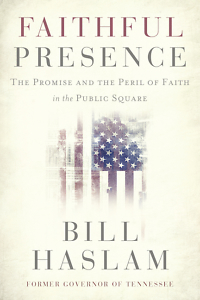 Haslam: I don’t think cynicism does any good. I think what we’re all trying to do is to hopefully make a difference. I’ve never seen a cynic make a difference.
Haslam: I don’t think cynicism does any good. I think what we’re all trying to do is to hopefully make a difference. I’ve never seen a cynic make a difference.
Chapter 16: Does it concern you that people might think you’re naive?
Haslam: I’ve definitely been accused of that before. But I would answer this: How is the other approach working? The approach where we’re constantly taking shots at the other side on the Internet and we’re trying to win the social media battle, the cleverest retort? Is that getting us anywhere?
Chapter 16: Do you think Christians can lead the way out of partisanship when so many of the players seem to prefer it that way? Senate Minority Leader Mitch McConnell is a Baptist, for example. It just seems like a lot of the people who are participating in partisanship see it as a viable and good strategy.
Haslam: My message to people of faith on both sides of the aisle will be this: The ways that Jesus talks about how we should act aren’t dependent upon the circumstances we’re in. In business, we don’t say you should act ethically unless you’re getting ready to go out of business. Or in your marriage you should be faithful, unless the person in the office next to you is really attractive. We don’t make those exceptions. Yet because I don’t think we’ve thought out the theology of our politics very well, we haven’t really thought about how we should act in the public sphere.
Chapter 16: When President John F. Kennedy faced opposition because of his Catholic religion while running for president, he basically just made a speech to say that he would always put the country above the church’s position, and that would be his first priority. Should politicians make statements like that today?
Haslam: I think it’s a complicated question, because the whole relationship between religion and government in our country has been a complicated issue for a long time. I think you have to distinguish between the government establishing a religion, which our Constitution prohibits, and the free exercise of religion, which the Constitution encourages and says shall not be prohibited. So I think all of us bring our worldview to the public stage, no matter whether we’re there as a voter or an elected person, or helping somebody get elected. Those views I don’t think should change when we come to the public square and say, “Well, here’s what I believe, I’m going throw that away in the closet while I’m playing this public role.” I don’t think anybody should have to do that. But that’s very different from having the government actually set up an official religion.
Chapter 16: You say it’s important for leaders to be humble, gentle, and full of mercy, and you bring up Nelson Mandela. Does anybody active today fit that bill for you?
Haslam: I think there’re a lot of folks that do, over time. The example I also point to in the book is [President Abraham] Lincoln. I think that was a guy you can describe that way. That didn’t mean he was weak. He was willing to withstand the death of 600,000 citizens to keep the country together and to eliminate slavery. If you look at the writings of Dr. [Martin Luther] King, I think those thoughts are infused. There are people on the political stage today who fit that bill, although all of us do it imperfectly. Believe me, there were times when I was in office when I found my own advice hard to follow.
Chapter 16: Have you ever made a decision based on what your political advisers or campaign donors wanted, primarily? You mentioned that as a no-no in the book.
Haslam: When you’re weighing a decision, if you’re doing it the right way, you weigh a lot of things. You weigh the political impact, what the people who are for and against are saying. Ultimately, it should be what’s the right thing to do for the people that I’m here to serve. It’s easier said than done.
Chapter 16: Religion has been declining in the United States, including Christianity. Do you think the role of religion in politics might at some point, maybe closer in the future than we think, be irrelevant, because people won’t be religious?
Haslam: Our country’s changing a lot. I think that changing culture will affect the politics of today and down the road. If you look at the numbers, a lot of what’s changing are those people who I would call nominal believers. When we were growing up and when our parents were growing up, you belonged to a church. That’s one of the things you did. Today, there’s not the same cultural expectation. I’m not sure that’s a change in the many people who are truly trying to walk their faith.
Chapter 16: You call out the media for some of our division. Is there anything that can be done on the public policy side to improve that situation?
Haslam: I don’t know that it’s so much a public policy question. I think it’s more of an awareness situation. We have to realize that the media, in many cases, has a business model based on outrage. The cable news channels are predicated on getting you upset at the other side and upset enough that you’ll tune back in tomorrow night, and the night after that and the night after that. If the business model is outrage, you need to understand that’s what they’re trying to drive you toward. I think the other big impact is [that] we can all choose the news we want, and you can get whatever perspective you want to read or listen to or watch.
Chapter 16: How do you think a Christian should approach climate change?
Haslam: I think you begin with this awareness that it’s part of creation. We should be concerned with what the impact is. We should be doing our homework to decide what are the short-term gains that have long-term impact. Of all people, we should be the people who are thinking about not just the present moment, but 10 years from now and 50 years from now, 100 years from now.
One of the things that’s interesting to me is if you look at the left and right on two big issues, the debt and deficit. You have folks on the right saying, “OK, I get why we would be flooding the economy with stimulus money now, but there’s a real concern about the long-term deficit gap that the country is going to take on.” So [they’re] saying, “We understand the short-term concern, but we’re more concerned about the long term.” The situation is exactly reversed when you look at issues around climate change. Folks on the left are saying, “We need to make some short-term sacrifices in order to ensure a long-term good.”
Chapter 16: Former President Donald Trump did quite well with lots of Christians, especially evangelicals. What do you think about that?
Haslam: This book is not about any certain political figure. It’s more about what we are called to act like in the public square. This book is not a reaction to Donald Trump or a reaction to the growing secularization of the country. It’s more, “Here’s what Christians should be acting like in the public square.”
Chapter 16: How confident are you that your message is going to get out there and change people’s thinking?
Haslam: As a first-time writer, I have no idea. I wouldn’t be delusional enough to think this is going to change the argument and change the country. I hope it’s a beginning of a way for people to say, “I really do need to develop a theology of what I’m going to act like when I enter the public square.” I want to put a foundation out [there] for a new way of thinking.
Chapter 16: When you write about why politicians write books, one of the things you say is that a lot of times it’s to set up a run for office. Are you done with that? Are you thinking of running for something else?
Haslam: I don’t know the answer. I’m certainly not planning on running for anything right now. I think if you read this book, it’s not the kind of book that you’d write if you’re trying to set up a run for office. I mean, never say never. But I’m definitely not planning on anything at this point.
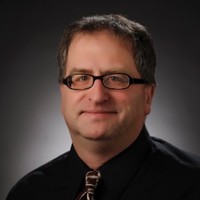
Jim Patterson is a Nashville freelance writer whose work appears often on the United Methodist News website. He has been a reporter for The Associated Press in Nashville and senior writer and public affairs officer for Vanderbilt University.

